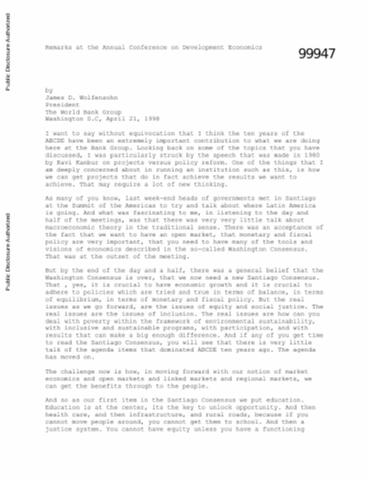Water rights and poverty alleviation: inclusion and exclusion of resource-poor women and men as rights holders in externally supported irrigation development
Taller Instrumentos Metodológicos para la Toma de Decisiones sobre Manejo de los Recursos Naturales en Laderas (1998, Yorito, Yoro, Honduras). Memoria
Comunidades y tierra en el Ecuador
Como resultado de la implementación de las políticas neoliberales en la región durante las dos últimas décadas, el problema de la tierra ha pretendido ser “archivado” no sólo en las políticas sectoriales sino también en las discusiones sobre el problema agrario y rural en general.
The Politics of Conservation and the Complexity of Local Control of Forests in the Northern Thai Highlands
This paper argues that conflicts in the northern Thai highlands are a clear case of the politics of environmental discourse in the sense that conservation has played a role in lending legitimacy to both government agencies and ethnic communities in their struggle for the control of forest resources. Underlying such conflicts is the official line of negative thinking about ethnic minorities in the hills by associating them with various vices, namely as enemies of the forest, opium producers, and a threat to national security.
Réforme agraire: colonisation et coopératives agricoles 1998/1
This issue of Land Reform, Land Settlement and Cooperatives includes interesting descriptions of land tenure and related policies in Uganda, Tunisia, the United Republic of Tanzania and Morocco. Two thought-provoking articles on access to land and other assets focus on policies to reduce poverty and the function of markets in the allocation of production resources. In the first, J. Melmed-Sanjak and S.
INDIA: Bihar-Madhya Pradesh Tribal Development Programme
In preparing an investment project, development strategies and project components are defined and revisited during project formulation through a consultative process that often includes Socio-economic and Production Systems Studies. These studies are conducted to develop an appreciation of the situation in which the intended beneficiaries live, and their perceptions of their problems, needs and priorities. The present study was carried out on the socio-economic situation of tribal communities and livelihoods in selected areas in Madhya Pradesh and Bihar in India.
Remarks at the Annual Conference on Development Economics
James D. Wolfensohn, President of the World Bank Group, discussed that it is crucial to have economic growth and it is crucial to adhere to policies which are tried and true in terms of balance, in terms of equilibrium, in terms of monetary, and fiscal policy. The real issues are how can one deal with poverty within the framework of environmental sustainability, with inclusive and sustainable programs, with participation, and with results that can make a big enough difference.
Sistema integrado de combate a pobreza em Ouro Preto, Brasil
Proyecto Gestión Urbana en Ciudades Intermedias Seleccionadas de América Latina ITA/95/S71
Government spending, growth and poverty
Poverty in rural India has declined substantially in recent decades. This steady decline in poverty was strongly associated with agricultural growth, particularly the green revolution, which in turn was a response to massive public investments in agriculture and rural infrastructure. Public investment in rural areas has also benefitted the poor through its impact on the growth of the rural non-farm economy, and government expenditure on rural poverty and employment programs,which has grown rapidly, has directly benefitted the rural poor.
Rural Poverty: Population Dynamics, Local Institutions and Access to Resources
Analyses two examples of changing institution-resource access relationships in Africa and Latin America. The Africa case (Kakamega, Western Kenya) highlights the resource endowments and problems associated with the participation of individuals in multiple institutions, whereas the Latin America case (Oaxaca, Mexico) focuses on the changes in a single institution in response to population growth. Suggests that even in situations of complexity, there are some clear entry points and directions for policy advice.










